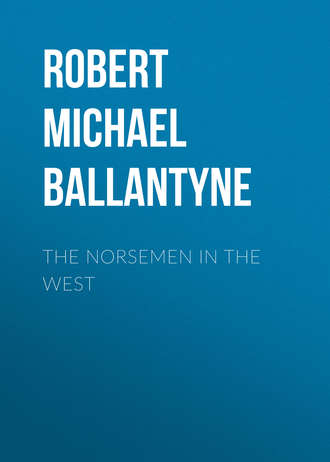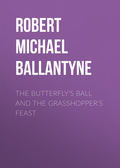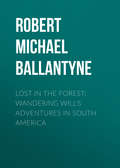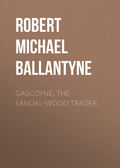
Robert Michael Ballantyne
The Norsemen in the West
There were two points of great interest connected with this feast, which we must not omit to mention. One was, the unexpected arrival, in the middle of it, of the old chief, Whitepow, in a canoe, with Utway and a few of his principal men, and his grandson Powlet. These were hailed by both parties with great delight, because they formed an additional bond of union between them.
It had been arranged by Karlsefin, for the sake of security, that the savages and Norsemen should not intermingle, but that they should sit in two distinct groups opposite to each other. Whitepow, however, ignorant of, or indifferent to such arrangements, passed over at once to the Norsemen on his arrival, and went through the ceremony, which he had so recently acquired, of shaking hands all round. Powlet also followed his example, and so did Utway. They then sat down, and the latter did good service in the cause of peace by making an enthusiastic speech, which the Norsemen could see, from his pantomimic motions, related to his own good treatment at their hands in time past.
Powlet also unwittingly aided in the same good cause, by running up to Olaf and bestowing on him a variety of attentions, which were all expressive of good-will and joy at meeting with him again. He also shouted the name of Snorro several times with great energy, but Olaf could only reply by shaking his head and pointing towards the hamlet where Snorro and the women had been left under a strong and trusty guard.
The other point of interest to which we have alluded was, that a number of the savages became particularly earnest and eager, when the eating was concluded, in their endeavours to impress something on their new friends, which they could not for a long time be made to understand even by the most graphic and energetic signs.
“I fear, Krake, that you have eaten too much, or by some other means have spoilt your powers of interpretation,” said Leif with a laugh, as the puzzled interpreter shook his head for the fifth time at an energetic young savage with a red spot on his chin, and a blue stripe on his nose, who had been gesticulating—we might almost say agonising—before him for some time.
“’Tis beyond my powers entirely,” said Krake. “Try it again, Bluenose,” he added, turning once more to the savage with resolute intensity of concentration; “drive about your limbs and looks a little harder. I’ll make ye out if it’s in the power of man.”
Thus adjured, the young savage opened his mouth wide, pointed with his finger down his throat, then up at the sky, spread both hands abroad in a vague manner, and exclaimed “ho!” as though to say, “that’s plain enough, surely!”
“Oh, for shame! Is it eaten too much ye have? Is that what ye want to say?”
That was evidently not what he wanted to say, for the poor savage looked round with quite a disconsolate aspect.
“Come hither, Powlet,” cried Biarne; “you’re a smart boy; see if you can make the matter somewhat plainer.”
Powlet at all events understood his name, and Biarne’s beckoning finger, for he rose and went to him. Biarne confronted him with the young savage, and told the two to talk with each other by means of signs, which consisted in his touching the lips of both and thrusting their heads together.
The young savage smiled intelligently and spoke to Powlet, who thereupon turned to Biarne, and, rolling his eyes for a few seconds, uttered a low wail.
“Sure it isn’t pains you’re troubled with?” asked Krake, in a voice of pity.
“I do believe it must be that they refer to some one whom we have wounded during the fight,” suggested Leif, “and that they think we have him concealed in the hamlet.”
“It seems to me,” said Thorward, “that if they were troubled about a wounded or missing comrade, they would have asked for him sooner.”
“That is true,” replied Leif. “I wish we knew what it is they would communicate, for they appear to be very anxious about it.”
As he spoke, a tall savage, with an unusually grave countenance, stalked from among his fellows, thrust Powlet and the young man whom Krake had styled Bluenose aside, and seated himself on the ground in imitation of the free-and-easy manner of the Norsemen. Suddenly his face lighted up. He clapped both hands to his chest and breathed hard, then raised his hands aloft, looked enthusiastically up at the sky, rolled his eyes in a fearful manner, opened his mouth wide, and gave utterance to a series of indescribable howls. Checking himself in the midst of one of these, he suddenly resumed his grave aspect, looked straight at Krake, and said “Ho!”
That he thought he had hit the mark, and conveyed the meaning of himself and his friends precisely, was made evident by the other savages, who nodded their heads emphatically, and exclaimed “Ho!” with earnestness.
“H’m! ’tis easy to say ‘Ho!’” replied Krake, more perplexed than ever, “and if ‘Ho’ would be a satisfactory answer, I’d give ye as much as ye liked of that; but I can’t make head or tail of what it is ye would be at.”
“Stay,” exclaimed Hake, stepping quickly forward, “I think I know what they want.”
Saying this, he looked earnestly at the grave savage, and ran over one or two notes of a song.
No words in any language could convey such a powerful meaning as did the beam of intelligence and delight which overspread the faces of these sons of the wilderness. The “ho! ho! hos!” and noddings were repeated with such energy, that Krake advised them to “stop that, lest their heads should come off altogether!”
“I thought so,” said Hake, turning away from them; “they want you to give them a song, Krake.”
“They shall have that, and welcome,” cried the jovial Norseman, striking up the “Danish Kings” at once, with all the fire of his nature.
The natives sat in rapt solemnity, and when the Norsemen joined laughingly in the chorus, they allowed a faint smile to play for a moment on their faces, and murmured their satisfaction to each other when the song was done. But it was evident that they wanted something more, for they did not seem quite satisfied until one of their number rose, and going up to Hake touched his lips with his finger.
“Ha! I thought so!” exclaimed Krake in contempt. “It’s bad taste ye have to want a song from him after hearing me! But what else could we expect from ye?”
Hake willingly complied with their wish, and it then became evident that the savages had gained their point at last, for they listened with half-closed eyes, and more than half-opened mouths, while he was singing, and heaved a deep sigh when he had finished.
Thus pleasantly was the feast concluded, and thus they sealed their friendship.
But there was something still more satisfactory in store for the Norsemen, for it was soon afterwards discovered that the savages possessed a large quantity of beautiful furs, with which, of course, they were willing to part for the merest trifle, in the shape of a shred of brilliant cloth or an ornamental bauble.
This was not only fortunate, as affording an opportunity for the Norsemen to procure full and valuable cargoes for both their ships, but as creating a busy and interesting occupation, which would prevent the natives from growing weary of inaction, and, perhaps, falling into those forms of mischief which proverbially lie ready to idle hands.
“It seems to me, friends,” said Leif one evening, shortly after the feast just described, while he was seated in the chief hall, polishing his iron headpiece, and occasionally watching the active hands of Gudrid and Thora as they busied themselves about domestic affairs, while Bertha sat beside him dandling Snorro on her knee,—“It seems to me that we have got together such a rich cargo that the sooner we send our ships to Greenland the better. They can then return with fresh supplies of such things as are needed in good time. For myself, I will go with the ships, and overlook the loading of them in Greenland.”
“Oh! may I go with you?” exclaimed Bertha, looking up suddenly with much eagerness.
Hake, who was seated at the lower end of the hall, busily engaged in making a bow, paused abruptly in his work, but did not raise his head.
“I have no objection, if Freydissa has none,” answered Leif.
“Freydissa will be only too glad to get rid of her,” replied that amiable woman, who was engaged in the manufacture of a leathern tunic for Snorro; “she is tired of milk-and-water.”
“And yet milk-and-water is more likely to agree with you than anything resembling beer,” said Biarne, with a laugh.
“I should be sorry to leave Vinland,” returned Bertha, “but I am very very anxious to see my dear father again. Besides—I can return hither.”
Hake’s hand was suddenly released, and resumed its occupation.
“If you go, Leif,” asked Karlsefin, “will you return and spend the winter with us?”
“I will not promise that,” replied Leif with a smile.
There was silence for some minutes, which was broken at length by a very small voice saying:—
“’Norro go to G’eenland too?”
Poor Snorro was as regardless of the S in his own name as he was of the l in Olaf’s!
“’Norro may go, if Gudrid will allow him,” answered Leif, patting the child’s curly pate.
“And O’af too?” added Snorro.
“Of course I must go if Snorrie goes,” cried Olaf who had just entered the hall. “We could not live separate—could we, Snorrie?” He caught up the child and placed him on his back in his wonted fashion. “Just think,” he continued, “what would it do in Greenland without O’af to give it rides and take it out for long walks?”
“Ay, and go lost with it in the woods,” added Biarne.
Olaf blushed, but replied promptly— “That would be impossible, Biarne, for there are no woods in Greenland.”
“If Snorro goes so must I,” said Thora. “He could not get on without his nurse.”
“Methinks we had better all go together to Greenland,” said Astrid, who was busy preparing supper.
“Not bad advice,” observed Biarne, somewhat seriously.
“Do you mean what you say?” asked Karlsefin.
“I half mean it,” replied Biarne.
There was a pause here. Karlsefin then said— “It seems to me, friends, that our minds are all jumping together. I have thought for a long time of leaving Vinland, for it is plain to me that as we stand just now we cannot make much headway. Many of our men are longing to get back to their families, some to their sweethearts, and some to their native land; while, from what you have said, it would seem that none of us are very anxious to remain.”
“Do not speak for all,” said Thorward.
“Well, dost thou wish to stay?”
“It may be that I do. At any rate, we have had much trouble in coming hither and settling ourselves, and it would be a pity to lose all our labours unless we can’t help it. There may be others of my way of thinking in the colony. It is my advice that before we discuss such a matter we had better call a Thing, (an assembly for discussion) and do it in an orderly way.”
“By all means,” said Karlsefin, “let us discuss the matter for decision in a Thing; yet our discussing here for amusement is not disorderly.”
After a little more conversation it was finally arranged that a Thing, or general assembly of the people, should be called on the following day, to discuss and decide on the propriety of forsaking Vinland and returning home.
Chapter Twenty Five.
The First Congress and the Last Farewell
At the gathering of the Vinland colonists next day a number of able speeches were made by various individuals; for the Norsemen of old were accustomed to the free discussion of public affairs, at a time when nearly all Europe was crushed under the yoke of feudalism. Some of the speeches were humorous, and some had a good deal of sound about them without much weight of matter—a peculiarity, by the way, which marks many of the speeches made in the national and general assemblies of mankind in the present day, not less, perhaps rather more, than in the olden time.
All the men of the colony were entitled to raise their voices in the council except the thralls, so that the brothers Hake and Heika took no part in the discussion. These two therefore held a private confabulation of their own on the margin of the lake.
Thorward was among the first speakers at the assembly.
“It is my opinion,” he said, in the tone of a man who expects to have his opinion opposed, “that we have not yet given Vinland a fair trial. We are only just beginning to discover the value of the land. Ye know now that it is not a small island, as was at first supposed, but a vast country of unknown extent. Who knows but that it may be as large as Norway? This lake and river on which we dwell do not owe their birth to an insignificant country; any man with half the vision of one eye remaining may see that! The woods supply all that man can desire; the waters swarm with fish; the climate is delightful; our ships are even now loaded to the bulwarks with costly furs, and the natives are friendly. What would ye more? It seems to me that we might, if we chose, lay the foundation of a new nation that would rival Iceland, perchance equal old Norway itself, if we take advantage of the great opportunities that have fallen to our hands. But if we get frightened at the yell of every savage that makes his appearance, or grow weary of good, vigorous, hard work, and begin to sigh like children for home, then there is small chance of our doing anything, and it will doubtless be the fate of a bolder race of men to people this land at some future time.”
There was a good deal of applause from some of the people when Thorward finished this speech, which was uttered with great decision, but it was observable that those who thought with him, though noisy, were not numerous.
The moment Thorward sat down Krake started up and said somewhat warmly— “’Tis all very well for Thorward to speak in this way, and ask ‘What would ye more?’ seeing that he has got in his house a handsome and sweet-tempered wife; but I will tell him of something more that I want, and that I haven’t got just now, and am not likely to get as long as I remain in Vinland. There is a comely little woman in Iceland, who was born in that best of countries, Ireland, and who forsook the land, and her father and mother, and kith and kin, all for the sake of a red-headed thrall—for he was no better at that time—called Krake. Now, I want that sweet little Irishwoman! Moreover, there’s a stout curly-headed boy in Iceland who’s an elegant chip of the ancient tree, and the born image of his mother—I want that curly-headed boy! Then there are six other curly-headed boys in Iceland—only that three of them are girls, and the youngest had the curls in prospect when I saw it last, bein’ as bare on the head as the palm of my hand—all of them descending in size, one after another, from the first curly-headed boy—I want these. Besides which there is a sweet little hut in Iceland at the edge of a swamp, with the spouting waters not far off, and the boilin’ waters quite handy to cook your dinner without firin’, and a lovely prospect of the burnin’ hill behind—I want all that; and I want to know how Thorward would feel if he wanted all that and couldn’t get it, and was advised to go on wantin’ it, and if he couldn’t keep himself easy, to try his best to keep as easy as he could!”
There was some laughter and great applause at this point.
“Moreover,” continued Krake, with increasing energy, “it don’t give me a scrap of comfort to be told that this is a vast country, full of all that’s desirable and the best of livin’, when I can’t enjoy it along with my sweet little Kathleen and the curly-headed boys and girls before mentioned. What does Krake care for stuffing his own ugly carcase full when mayhap the wife and bairns are dyin’ for want—anyhow dyin’ to see their husband an’ father? And what does Krake care to be the beginning of a new nation? No more than he does to be the middle of it, and if left to himself he’d far sooner be the end of it by not beginning it at all! As for being frightened by the yells of savages, it’s not worth my while to mention that, but when Thorward talks about beginning to sigh like children for home, he misses his mark entirely. It’s not sighing I am for home, but roaring, bellowing, howling for it in my wearied spirit, and it’s my opinion, comrades, as I gaze round upon your speaking faces, that there’s a good many here howling along with me.”
There could be no doubt that Krake’s sentiments were largely entertained and appreciated, for his speech was followed by prolonged and enthusiastic applause, in which the Norsemen not only raised their voices, but rattled their arms on their shields by way of emphasis. Thorward smiled grimly and shrugged his shoulders, but made no reply.
After several others had spoken in various strains—a few in favour of Thorward’s opinion, but many more in sympathy with Krake,—Leif made a short speech, advising immediate return to Greenland, Biarne followed suit, and Karlsefin wound up with a few remarks, in which he urged, among other things, that although the savages were friendly just then, it was not likely they would remain so very long, and in the event of a quarrel it was certain, considering their great numbers, that the infant colony would be kept in perpetual hot water, if not actual warfare. He suggested, moreover, that the proper way to establish a colony, that would have some chance to survive and flourish, would be to organise it thoroughly in Iceland or Norway, and induce so many married men with their families to emigrate, that they would be able to feel at home in the new land, and thus wish to remain. He concluded by saying that those who now desired to remain in Vinland might join together and devote their energies to the getting up of such a band of colonists if so disposed. For his own part, since the majority were evidently in favour of returning home, he was free to confess that he had no taste for colonising. The ocean was his home, and when that failed him he hoped that God might permit him to end his days and lay his bones in Iceland.
It was finally agreed that the country should be abandoned, and that, having made up their minds, they should set about preparations without delay.
We have said that the Scottish brothers had gone to the margin of the lake to hold a little consultation by themselves, while the affairs of the nation were being settled in the grand parliament.
“What think you? Will these men of Iceland decide to return home or to remain here?” said Hake, seating himself on a bank of wild-flowers, which he began to pluck and scatter with an absent air.
“They will decide to forsake Vinland,” answered Heika.
“You appear to be very sure, brother.”
“I am; because I have been watching the men for some time past, and occasionally leading them on to talk about the matter.”
“Which way do you hope they will decide?” asked Hake.
“I hope they will leave.”
“Do you? For my part I care but little. It seems to me that we have as small a chance of escaping from Greenland as from this land.”
“Brother, ye think in this way because you are content to remain where Bertha dwells. If Bertha were with Emma in bonny Scotland, your wits would be sharp enough to perceive that the voyage from Vinland to Scotland, with an unknown sea between, would be a more hazardous venture than a voyage from Greenland to Scotland, with Iceland between.”
“That may be true, brother, but methinks my wits are sharp enough to perceive that neither voyage concerns us, seeing that we have no ship, and are not likely to succeed in persuading a whale to carry us over.”
“Nevertheless,” replied Heika, “I mean to go over to Scotland this summer if I can.”
Hake looked earnestly in his brother’s face.
“From your tones and words,” said he, “I know that you have some plan in your head.”
“That have I,” rejoined Heika firmly, yet with a look of sadness.—“Listen, Hake: the thought that I shall never more see Emma or my father is more than I can bear. I will now make the effort to escape from Greenland—for well assured am I that we shall soon be there again—or die in the attempt. Of what value is a thrall’s life? The plan that I have in my head is this. You know that when in Greenland we were often sent out beyond the fiord to fish and to hunt the walrus and the seal—sometimes in large, sometimes in small, boats. The boats on Eric’s fiord are numerous now. The absence of one for a time would not be much noticed. There is a man there whose life I saved not long before we set sail for Vinland. He has a good boat, which I will borrow, take it round to the western skerries, to which our men seldom go, and there quietly fit it out for a long voyage. When a fitting time arrives I will set sail for Scotland.”
Hake shook his head.
“What wild thoughts are these, brother? Who ever heard of a man crossing the ocean in a small boat?”
“The thing may be done,” replied Heika. “It is risky, no doubt; but is not everything more or less risky? Besides, I had rather die than remain in thraldom.”
He paused, and Hake gazed at the ground in silence.
“I see,” he continued sadly, “you do not like my project, and will not aid me in the enterprise. After all, how could I expect that you would be willing to forsake Bertha and face so great a danger?”
Hake still continued to gaze in silence, and with a strangely perplexed air, at the ground.
“Well, well, Hake,” resumed the other, in a tone of reproach, “I did not expect that ye would go with me on this venture, but truly I had counted on your sympathy and counsel as well as your aid.”
“Ye do wrong me,” cried Hake, suddenly starting up and seizing his brother’s hand; “I not only sympathise with you, but I will go with you. It is not easy all at once to make up one’s mind on a point of such importance. Forsake Bertha I never will as long as one drop of Scottish blood flows in my veins, for I know that she loves me, though her sense of duty keeps her aloof—for which I love her all the more. Nevertheless, I will leave her for a time. I will make this venture with you. If we perish, we perish. If we succeed I will return to Greenland with a force that will either induce or compel the surrender of my bride.”
“Thou art a bold lover,” said Heika, smiling. “What! wilt thou carry her off whether she will or no?”
“Not so; but I will carry her off whether Leif or Karlsefin, or Biarne or Thorward, or all Greenland put together, will or no!”
“Nay, brother, that may not be. It were the maddest venture of all. I will run this risk alone.”
For some time the brothers disputed upon this point and held out against each other pretty stoutly. At length Heika reluctantly gave in, and it was finally agreed that Hake should join him in the proposed attempt to regain his liberty.
It did not take long to make the necessary arrangements for leaving Vinland. The little colony had not struck its roots very deeply into the soil. They were easily torn out without damage to the feelings of any one, for little Snorro, as Krake said, was the only creature that had to bid farewell to his native land—always excepting some of the cattle and chickens—and he was too young to take it much to heart.
In a few weeks the Snake, and Thorward’s ship, the Dragon, were loaded with everything that was of value in the colony, including much even of the rude furniture of the huts.
Before leaving, Karlsefin resolved to give a last grand feast to the savages. He therefore called them together and explained, as he best could, that he and his friends were going to leave them, but that perhaps some of them might return again with large supplies of the gay cloth and ornaments they were so fond of, and he recommended them in the meantime to make as large a collection of furs as they could, in order to be ready to trade when the white men returned. He then spread before them the most sumptuous feast the land could provide, including a large quantity of dairy produce, which the savages regarded as the most luxurious of fare.
After the feast he presented Whitepow, Utway, and Powlet with a large quantity of bright-coloured cloth and a few silver and iron ornaments, to be distributed among the members of the tribe as they should see fit after helping themselves. He also gave them a few cattle and domestic fowls, after which, weighing anchors, putting out the oars, and hoisting their sails, the Norsemen bade farewell to Leifsgaard. As they swept round the point which shut it out from view, they gave vent to one vigorous parting cheer, which was replied to by the savages with a feeble imitation and a waving of arms.
Dropping down the river, they passed the spit of sand where the first night in Vinland had been spent so pleasantly; caught an offshore breeze that carried them swiftly beyond the island betwixt which and the shore they had captured the whale, and finally leaped out upon the swell of the great ocean.
“Aha! now am I at home,” exclaimed Karlsefin, with heightened colour and sparkling eyes, as he stood at the helm, and glanced from the bulging sail to the heaving swell, where Thorward’s Dragon was bending over to the breeze about a cable’s length to leeward,—“Now am I at home once more!”
“So am not I,” murmured poor Bertha, whose white face betrayed the miserable emotions—or commotions—within.
All the women, we may remark, had expressed a desire to keep together during the voyage, hence they had embarked in the Snake, which was a better sea-boat than Thorward’s vessel.
“Of course you are not at home. You are never contented or at home anywhere!” cried Freydissa sharply.
Hake wished with all his heart that Bertha was at home in Scotland, and that her home was his; and Snorro, who was seated on Olaf’s knee, said—
“Never mind, Bert’a, oos be a tome soon.”
There was a general laugh at this consolatory remark; even Bertha smiled faintly as she patted Snorro’s head, while Astrid and Thora—not to mention Gudrid—agreed between themselves that he was the dearest, sweetest, and in every way the most delightful Vinlander that had ever been born.
“Of that there can be no doubt,” said Leif, with a laugh, “since he is the only white Vinlander that ever was born.”
But although the party assembled on the poop indulged at first in a few humorous remarks, they soon became silent and sad, for they were fast leaving behind them a spot which, with all its drawbacks, had been a pleasant and happy home for upwards of three years.
As they stood leaning on the rails that guarded the poop, and gazed regretfully on the lessening hills, each recalled many pleasant or stirring incidents which had occurred there, incidents which would remain—however far or long that land might be left behind—for ever engraven on their memories. And, long after twilight and distance had concealed the coast from view, the Norsemen continued to strain their vision towards the horizon, mentally bidding a long and last farewell to Vinland.







